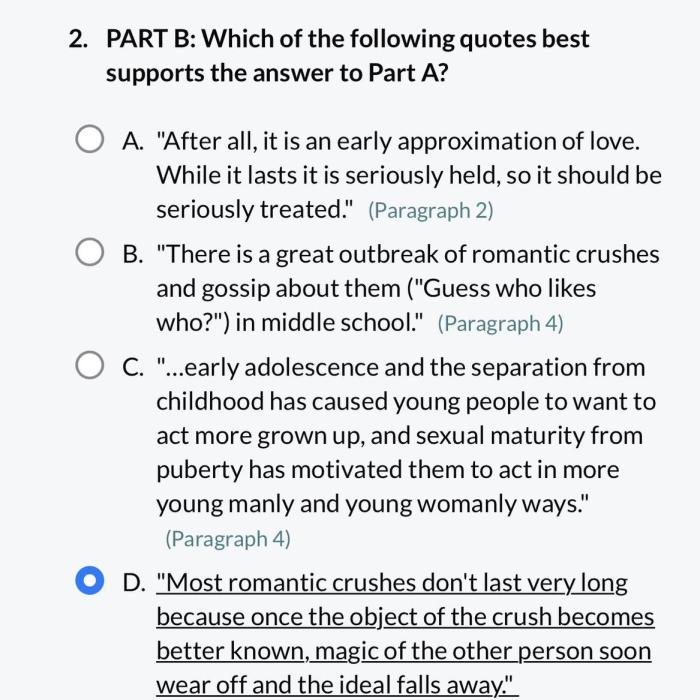Adolescence and the teenage crush answer key – Welcome to our in-depth exploration of adolescence and the teenage crush, an intriguing topic that delves into the psychological and emotional rollercoaster that shapes the lives of young adults. This comprehensive guide will provide valuable insights, practical advice, and a deeper understanding of this pivotal stage of human development.
Adolescence marks a period of significant transformation, characterized by a whirlwind of physical, emotional, and social changes. It is during this time that crushes become a common occurrence, playing a pivotal role in shaping self-esteem, confidence, and social skills.
Adolescence and the Teenage Crush
Adolescence is a period of significant psychological and emotional changes that contribute to the development of crushes. These changes include increased sensitivity to social cues, a heightened sense of self-awareness, and a growing need for intimacy.
Crushes can take many different forms, from brief infatuations to long-lasting relationships. They can be directed towards peers, older individuals, or even celebrities.
The Role of Social Media and Technology
Social media and technology have significantly impacted the way teenagers interact with their crushes. Online platforms provide new opportunities for connection and communication, but they can also create unrealistic expectations and increase the potential for cyberbullying.
The Impact of Crushes on Teenage Development

Self-Esteem and Confidence, Adolescence and the teenage crush answer key
Crushes can have a significant impact on a teenager’s self-esteem and confidence. A positive crush can boost a teenager’s feelings of worthiness and attractiveness, while a negative crush can lead to feelings of inadequacy and rejection.
Benefits and Drawbacks
Having a crush can provide numerous benefits, such as increased motivation, social skills development, and emotional maturity. However, it can also lead to potential drawbacks, such as social anxiety, jealousy, and unrequited love.
Parental Perspectives on Teenage Crushes
Common Concerns and Questions
Parents may have various concerns and questions about their teenagers’ crushes, including:
- Is it normal for my teenager to have a crush?
- How can I support my teenager through this experience?
- What are the potential risks and benefits of my teenager having a crush?
Guidance for Parents
Parents can support their teenagers by:
- Providing open and non-judgmental communication
- Setting clear boundaries while respecting their teenager’s privacy
- Educating their teenager about healthy relationships and consent
Cultural Influences on Teenage Crushes

Cross-Cultural Perspectives
The perception and experience of teenage crushes vary across cultures. In some cultures, crushes are seen as a natural part of adolescence, while in others they may be discouraged or even forbidden.
Media and Popular Culture
Media and popular culture play a significant role in shaping teenagers’ expectations and behaviors related to crushes. Romantic comedies, teen dramas, and music often portray idealized and unrealistic relationships, which can influence teenagers’ views on love and romance.
Ethical Considerations

Power Imbalances and Consent
Ethical issues may arise in relation to teenage crushes, particularly when there is a power imbalance between the parties involved. It is crucial to ensure that both parties are comfortable with the level of intimacy and that consent is obtained before engaging in any sexual activity.
Navigating Ethical Dilemmas
Parents and educators can help teenagers navigate ethical dilemmas by:
- Providing clear guidance on appropriate and inappropriate behaviors
- Encouraging open and honest communication about relationships and consent
- Supporting teenagers in making informed and responsible decisions
Expert Answers: Adolescence And The Teenage Crush Answer Key
What are the common types of crushes that teenagers experience?
Teenagers may experience various types of crushes, including peer crushes (within their peer group), celebrity crushes (on famous individuals), and unrequited crushes (on someone who does not reciprocate their feelings).
How can parents support their teenagers through the experience of having a crush?
Parents can provide support by listening attentively, offering guidance and advice, and respecting their teenager’s privacy while setting clear boundaries. Open communication and a non-judgmental approach are crucial.
What ethical considerations should be taken into account regarding teenage crushes?
Ethical considerations include respecting boundaries, ensuring consent, and being mindful of power imbalances. Teenagers should be encouraged to engage in healthy relationships based on mutual respect and understanding.